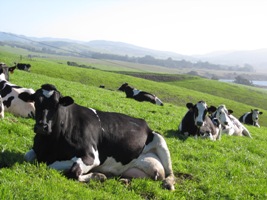
UPDATE 10:45 a.m.: The state Senate approved AB 1265 in a 31 to 0 vote this morning. The Assembly is expected to take up the bill on Tuesday for concurrence on amendments made by the Senate. If approved, it will then go to Governor Brown.
Earlier post:
A coalition of farmer and ranchers is making a last ditch effort to save a popular land conservation program. The state has cut funding for the 46-year-old Williamson Act. Now, it’s up to counties to continue it.
About 15 million acres, half of California’s farm and ranchland, is enrolled in the program. In exchange for agreeing not to develop their land, farmers and ranchers get a tax break on those acres. Historically, the state has paid counties back for the lost tax revenue. Now, that funding is gone.
“The Williamson Act is one of the best things to help farmers stay in farming,” says Paul Wenger, president of the California Farm Bureau Federation. “It’s a very, very important land conservation program.”
Supporters of the program have battled for several years to continue state funding. Both Governor Schwarzenegger and Governor Brown proposed cutting the program’s $35-40 million dollar budget. In March, a stop-gap bill (SB 863) to provide the program with $10 million was defeated in the state legislature.